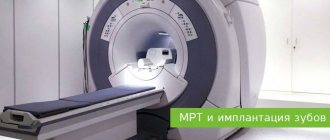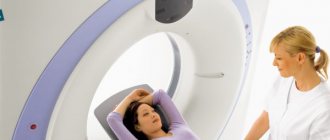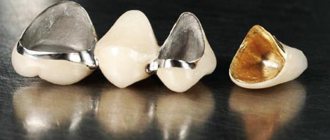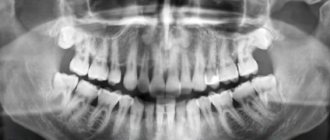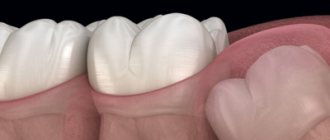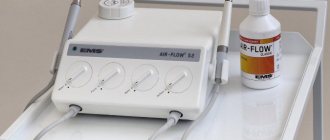Why are things made of metals removed before an MRI?
Features of titanium implants Crowns and pins Conclusions If you have ever had a magnetic resonance imaging scan, you know that before the examinations you are asked to remove all metal objects. With rings and earrings everything is simple. Is it possible to do an MRI with dental implants? After all, they cannot be removed during the procedure.
Safety of MR Imaging in Patients with Dental Appliances and Devices
An MRI scanner generates the powerful magnetic fields needed to produce images. Metals interact with magnetic fields in different ways. As a result of this interaction, a number of effects arise that affect the results of the examination - dark spots or so-called artifacts appear on the images, which can complicate or make diagnosis impossible, metal products can heat up or move under the influence of a magnetic field. The degree of this influence depends on what metal was used for the manufacture of metal structures for dental purposes.
Artifacts
Most often in dentistry, inert metals are used - titanium, gold and its alloys, zirconium, nickel, zinc, chromium, copper, silver, iron (stainless steel) - which do not interact with living tissues. Depending on the ability of these materials to cause artifacts, a distinction is made between MRI-compatible and non-MRI metals.
MRI-compatible metals that cause no or minimal artifacts include zirconium (the metal from which dental crowns are made), silver, zinc, copper alloys, titanium and its alloys, gold and its alloys, nickel and its alloys. Stainless steel, alloys containing large amounts of chromium and cobalt are not compatible with MRI and cause artifacts that complicate diagnosis. You can find out detailed information about the composition of the materials used to make dental structures from your dentist.
Heating the metal
The magnetic fields generated by an MRI machine can cause heating of metal products, up to temperatures sufficient to cause a burn. However, this is only true for metal objects that are on the surface of the patient's body - which is why it is recommended to remove all metal objects, jewelry, piercings and jewelry before the examination. Metal crowns, dental pins, implants, and dentures are less susceptible to this effect - studies on the safety of MRI in the presence of metal in the mouth have found that the heating of such products during research does not exceed 2-3 degrees Celsius. Therefore, MRI of the head or internal organs is a safe procedure for the patient, even in the presence of dental structures.
Displacement of metal structures for dental purposes
The magnetic fields generated during magnetic resonance imaging are capable of attracting metal objects made from magnetic metals, giving them significant acceleration. It is for this reason that before performing an MRI of the brain, spine or any other parts of the body, it is strictly forbidden to carry any metal objects on you. Otherwise, a piece of metal flying into the tomograph magnet can cause serious injury. In this case, is it possible to do an MRI with metal crowns on the teeth, with pins or braces? It is possible, since the mass of such products does not exceed several grams, and the structure itself is firmly fixed in the oral cavity. The exception is braces, dental crowns, bridges and dentures made of stainless steel. Removable structures must be removed before performing the procedure - this will not only make the examination safer, but will also improve the quality of the resulting images. If the structure is not removable, it is recommended to consult a dentist to check the strength of the fastening and prevent the product from moving.
conclusions
- There is no reason not to get an MRI if you have implants. Dental titanium is practically not magnetized. Titanium implants do not affect the examination results.
- Metal pins are also not a contraindication to tomography. The amount of metal there is minimal, and in fiberglass products it is completely absent.
- Metal dental crowns can distort results. This depends on the metal from which they are made, the number of prostheses and the organ being examined. Modern materials for prosthetics have low magnetic susceptibility. They are safer. In general, it is better to choose metal-free designs when installing crowns. This will prevent problems with MRI in the future.
Expert of the article Alexey Pavlovich Nesterenko Implant surgeon
Experience more than 10 years
With which implants is MRI of the brain contraindicated?
Implants are not a contraindication for brain MRI, since they are mainly made of titanium. Titanium and its alloys are compatible with MRI and result in virtually no artifacts in images. However, if non-removable stainless steel dental products are installed in the oral cavity, artifacts can cover most of the cervical spine and head, making the diagnosis of diseases of the brain and neck uninformative. If this happens, such research will not be paid for. You can obtain more detailed information from the doctors of our medical center.
| MRI of the head and neck, which shows |
| Stroke on MRI of the brain |
| MRI of the pituitary gland with contrast, what does it show? |
| MRI of the brain with contrast, how is it done? |
| Decoding MRI of the brain |
| MRI of cerebral vessels, which shows |
Crowns on teeth and MRI of the head
The presence of metal or metal-containing crowns and/or pins in patients is an absolute contraindication to MRI of the head, brain, neck and chest.
The type of metal used to make the crowns does not play a big role. It is not known for certain how metal dental crowns will behave inside a magnetic field. Gold crowns are not as dangerous for MRI, but they can cause serious interference, which degrades the quality of the images.
In addition to crowns, there may be pins in the patient's mouth. They are a metal screw or rod installed in the root of the tooth. Titanium, brass, steel, and copper are most often used for their manufacture. The purpose of the pins is to strengthen the dilapidated tooth. They are attached to the dental canal using threads or filling material. Often, patients themselves do not know what material they are made of and how their pins are secured, so in most cases there is no risk in performing MRI on such clients. An exception may be studies using magnetic resonance of those parts of the body that are located away from the head: the abdominal cavity and retroperitoneal space, pelvis, lower extremities.
Patient's feelings
There are many myths telling stories about performing MRIs with metal-ceramic crowns. They claim that:
- crowns move during the examination;
- structural elements heat up, causing pain;
- the patient suffers burns and injuries.
These stories have no basis. Theoretically, displacement of structures by insignificant fractions of a millimeter is possible, but official medicine does not know of such cases. The heating may be less than one degree.
Why can our articles be trusted?
We make health information clear, accessible and relevant.
- All articles are checked by practicing doctors.
- We take scientific literature and the latest research as a basis.
- We publish detailed articles that answer all questions.
A patient with crowns that do not have ferromagnetic inclusions will not feel anything. If a system with magnet-sensitive materials is installed, most likely the same thing will happen - a complete lack of sensation.
Dental indications for tomography
- Diseases of the temporomandibular joint;
- the presence of extraneous sounds when closing and opening the jaw, displacement of the lower jaw to the side;
- malocclusion;
- involuntary jaw movements;
- pain, discomfort when chewing food;
- spasms of muscle tissue when opening and closing the mouth;
- complications after treatment or tooth extraction;
- diseases of the pulp, gums;
- study of neoplasms in the maxillofacial region.
Should you tell your doctor that you have dental implants?
Dental replacement implants are made primarily from titanium. This is a paramagnetic material that does not resonate with a magnetic tomograph. But this does not mean that there are no restrictions on the examination.
To avoid having to undergo an MRI twice, notify your doctor about the implant so that he can change the machine settings
The diagnostician must be informed about artificial teeth for two reasons:
- Titanium is capable of distorting the picture. Yes, the metal does not heat up and does not move. But it can create minor interference. In order not to undergo an expensive procedure twice, it is better to immediately notify the doctor about the implant - he will change the settings of the device.
- The titanium pin is not the only element of the implant. In addition to the rod itself, there is also an abutment (gum former) and a crown. They are made from ceramics or various types of metal and then lined with porcelain.
Therefore, patients are always asked about the presence of implants at least twice: when giving a referral and immediately before diagnosis.
Impact of implants on the quality of results
The MRI machine will not have a negative effect on dental structures, but the presence of metal may negatively affect the quality of the image. It will become fuzzy, blurry, and the doctor will not be able to determine the condition of the structures.
Distortion is observed during examination:
- thoracic region;
- brain, skull;
- shoulder joints.
Not long ago, improved devices with PET/MRI technology began to be introduced. The new model eliminates the influence of noise from metal objects on the image. Before carrying out the procedure, you need to clarify which tomograph is used in the office . If an old-style device is installed, the doctor will adjust it taking into account the foreign body in the body, which will help improve the image of the area being examined
Risks of MRI diagnostics with titanium dentures
Due to the fact that prostheses implanted into the jaw bone are mostly made of paramagnetic titanium, magnetic resonance imaging with dental implants is a completely feasible and completely safe procedure. Titanium is a biologically inert material, i.e. it is not able to oxidize and release harmful substances during contact with bones, muscles and blood vessels of the human body. Of course, in medicine it is not pure titanium that is used, but its alloys with a small amount of other elements. This is done to make the material durable and light. But they also do not have any negative impact when undergoing an MRI.
By the way, titanium is comparable in strength to steel, and in lightness - to aluminum. Therefore, this metal has received recognition not only from dentists, but also from traumatologists and orthopedic surgeons.
Titanium is also used to produce abutments, gum formers, and metal arches (bases) for dentures.
Contraindications for MRI
MRI cannot be performed if there are metal objects in the body:
- hip or knee endoprostheses made of cobalt-chromium, cobalt-chromium-molybdenum alloys;
- steel plates, pins and screws;
- circular steel devices (Ilizarov, etc.);
- ferromagnetic middle ear implants;
- metallic tattoo dyes;
- metal fragments or bullets that cannot be removed for safety reasons;
- prosthetic heart valves;
- hemostatic clips.
The procedure is also contraindicated
, if observed:
- severe physical condition of the patient;
- installed nerve stimulators or insulin pumps;
- neurological diseases, mental disorders;
- claustrophobia;
- first trimester of pregnancy;
- decompensated heart failure;
- need for hardware monitoring.
